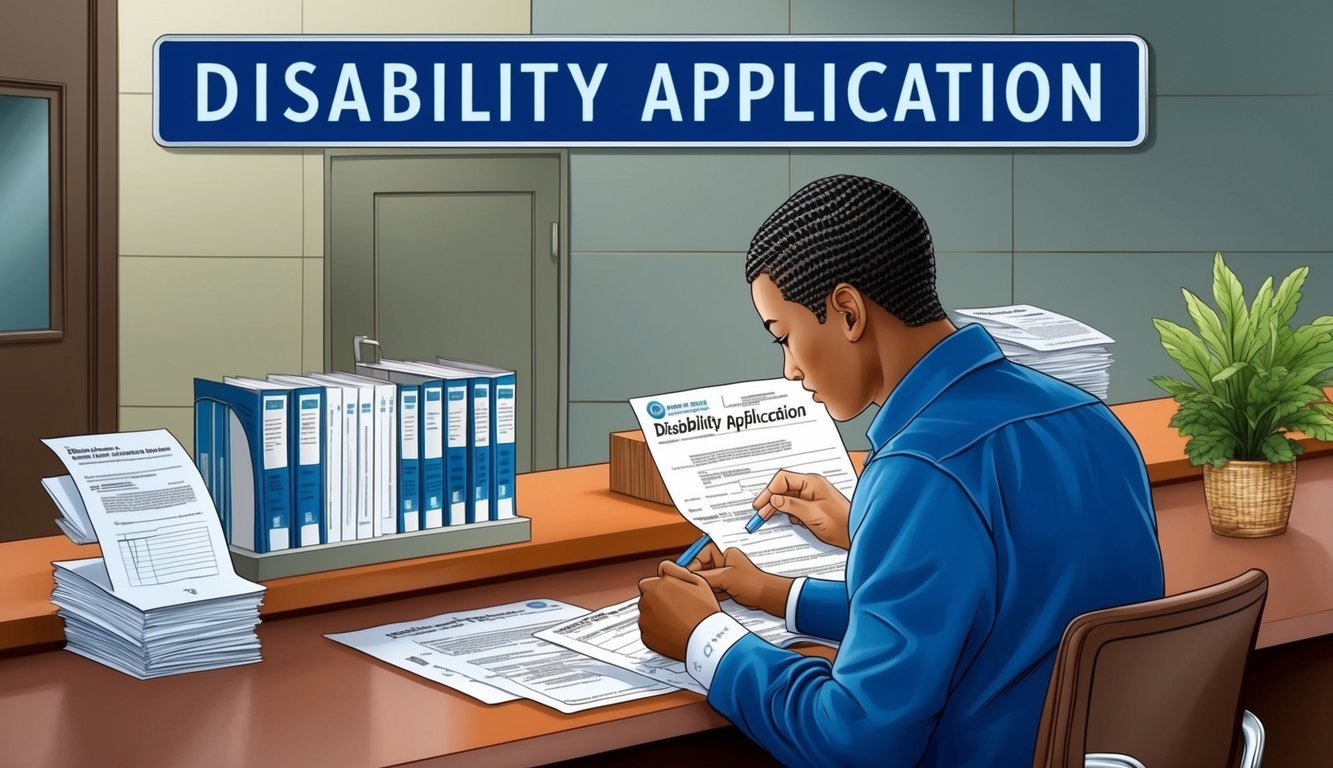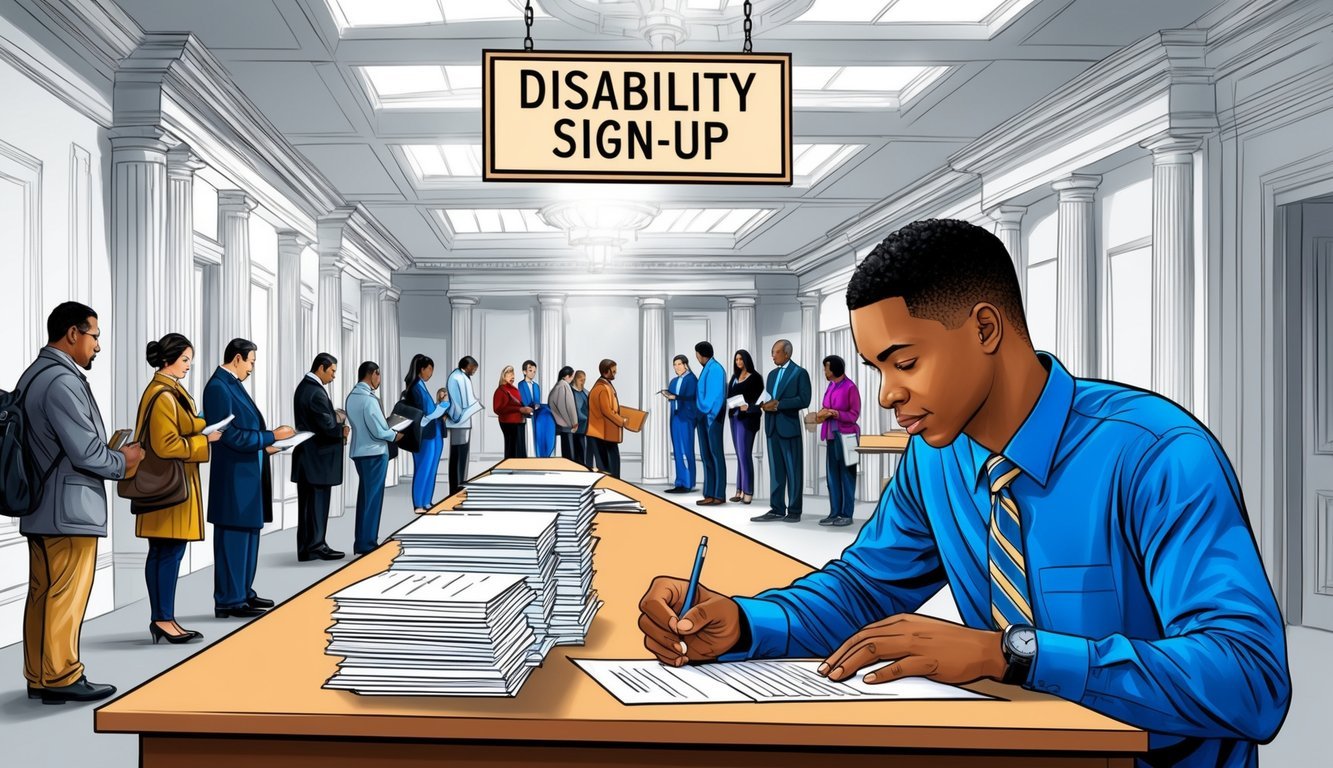Applying for disability in Florida might feel overwhelming at first, but trust me—it doesn’t have to be.
If you know where to start, the steps are pretty clear!
Before you dive in, gather some important documents and information.
Having everything ready can make a world of difference.

Ready to apply for disability benefits in Florida? You can kick things off online or call the Social Security Administration (SSA) to set up an appointment. Many folks find that applying online is the quickest and most convenient route.
You’ll be asked to provide information about your medical condition, work history, and personal details.
Remember, the sooner you apply after becoming disabled, the better.
The process can take some time, and it’s best not to put it off.
Be as thorough and accurate as possible when filling out your application.
The more complete your information, the smoother sailing you’ll have.
Key Takeaways
- You can apply online or by phone for disability benefits.
- Gather all your necessary medical and work history documents before you start.
- Apply ASAP once you realize you can’t work because of your disability.
Eligibility and Application Process

To snag disability benefits in Florida, you need to meet certain criteria and follow a few simple steps.
Let’s break down what you should know and do to apply.
Understanding Disability Benefits
In Florida, there are two primary types of disability benefits you could qualify for: Social Security Disability Insurance (SSDI) and Supplemental Security Income (SSI).
SSDI is designed for those of us who’ve worked and paid Social Security taxes, while SSI is tailored for people with limited income and resources.
Your medical condition needs to be serious enough to last at least a year or result in death, and it should significantly impact your ability to work.
The SSA has a specific list of conditions that they use to determine eligibility.
When it comes to SSDI, you’ll need a certain number of “work credits” based on your age at the time you became disabled.
For SSI, your income and resources must fall below specific limits.
It’s like a puzzle, and you’ve got to fit the pieces together just right!
Gathering Required Information
Before you apply, get your ducks in a row.
You’ll need your Social Security number and proof of birth.
If you’re not a U.S. citizen, have your immigration documents ready, too.
Next, gather the details about your medical condition.
This means names and contact information for your doctors and clinics, dates of treatment, and a list of any medications you take.
You’ll also want your work history handy.
Have your W-2 forms or tax returns from the past year, plus any details about workers’ comp or other benefits you may have received.
Oh, and don’t forget personal info like your birth certificate and proof of U.S. citizenship.
The SSA might require original documents, so keep them safe and sound.
Submitting Your Application
You can apply for disability benefits online through the SSA website.
It’s often the fastest route to take.
If you’d rather, you can also apply by phone or visit your local Social Security office.
When you apply, you’ll fill out the disability application form (Form SSA-16) along with an Adult Disability Report.
These forms will ask how your condition affects your daily life.
Don’t forget to include your medical records, work history, and any other documents to support your case.
If you’re looking for more guidance, check out how to apply for disability—it can make your journey smoother.
Need help? Visit a local Social Security office or poll the official SSA website.
After submitting your application, you’ll receive an application number.
Keep that number close—you’re going to need it later to check on your status!
If the SSA needs anything extra, they’ll reach out to you.
They might ask for additional medical records or even schedule a medical exam.
Make sure to respond quickly to avoid delays.
After Submission: What to Expect

Once your application is in, you’ll enter a waiting period.
It can take some time, so keep calm and stay informed.
Checking Application Status
You can check your application status online or by phone.
The SSA has an handy online portal where you can create an account and get updates on your application.
Prefer to chat? Call SSA’s toll-free number at 1-800-772-1213.
And remember to keep your confirmation number handy—you might need it!
Stay reachable, because the SSA might contact you if they need more info.
If you have any questions or need to update your application, don’t hesitate to reach out!
Understanding the Determination Process
Your application gets sent to the Florida Bureau of Medical Disability Program Operations, where your medical records and work history will be reviewed.
This typically takes about 3 to 5 months.
If they need more info, they might schedule additional medical exams.
Chill—it’s a normal part of the process.
They just want to ensure they have everything they need to make a fair decision.
Your claim will be assigned to a disability examiner who’ll evaluate how your condition affects your daily life and your ability to work.
It’s a detailed process, but it’s necessary to ensure that decisions are fair.
Appeals and Further Actions
If your claim gets denied, don’t throw in the towel just yet.
You have 60 days to appeal.
Your first step is to request a reconsideration.
A new examiner will take a fresh look at your case.
If you get denied again, you can ask for a hearing with an Administrative Law Judge.
This is your chance to present your case face-to-face.
It might be worth considering legal help at this point.
If all else fails, you can take your case to the Appeals Council or even file a lawsuit in federal court.
Remember, many claims get approved during the appeals process, so hang in there if you really need those benefits!
Frequently Asked Questions

Navigating the world of disability benefits in Florida can feel complicated.
Here are some common questions folks often have about the process, requirements, and timelines.
What steps do I need to take to apply for disability benefits in Florida?
You can apply for disability benefits online, by phone, or in person at a local Social Security office.
Just gather your medical records and work history, fill out the application form, and provide details about how your condition affects your work life.
What qualifies as a disability in Florida?
Florida follows federal guidelines to define disability.
Your condition needs to keep you from working for at least a year.
Some common qualifying conditions include mental disorders, musculoskeletal issues, and nervous system disorders. The key is focusing on how your condition limits your daily activities, not just the label.
What’s the usual wait time for getting disability approval in Florida?
The wait time varies, but it generally takes about two years from application to final decision.
The initial review takes about 3 to 5 months, but if you’re denied, appeals can really stretch that timeline.
What documents do I need to apply for Social Security Disability?
You’ll need medical records, work history, and other personal information.
Be ready with doctor’s reports, test results, treatment records, and your employment history for the past 15 years.
Don’t forget basic details like your Social Security number, birth certificate, and financial info!
Is there a specific form for Social Security Disability applications?
Absolutely! You’ll be using Form SSA-16 for Social Security Disability Insurance (SSDI) or Form SSA-8000 for Supplemental Security Income (SSI).
These forms will ask for details about your medical condition, work history, and personal information.
You can find them on the SSA website.
How does the emergency disability application process work in Florida?
Great question! Emergency disability applications, also known as Compassionate Allowances, speed up claims for severe conditions.
If you have a qualifying issue—like certain cancers or severe neurological disorders—your claim could be processed in weeks instead of months.
You’ll still apply through the regular process, but your condition will flag your application for expedited review.
Let’s face it: it can be frustrating.
But knowing what to expect can help you navigate through!

